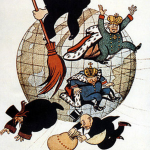
Much of Lenin’s socialist vision was predicated on the idea of ‘world revolution’ or ‘international revolution’, a belief that the overthrow of capitalism in Russia would initiate a steady flow of socialist revolutions around the world. This rising global socialism would foster an international spirit and motivate the working classes to take up arms against class enemies, rather than their fellow workers in other countries. National borders, most of which were drawn up by ruling elites, would weaken and become secondary to borders of class, privilege and elitism. Patriotism, xenophobia, racism and sexism would dissolve, giving way to comradeship and socialist unity.
Lenin and most of his Bolshevik allies adhered to this belief in international revolution. It became a pivotal theme in Bolshevik propaganda during World War I. This material told Russian soldiers that their German counterparts were not their enemy but their fellow workers. The Bolsheviks urged Russians not to kill their class brothers but to desert or fraternise with them. Alternatively, they were encouraged to mutiny and turn their guns on the real enemy: the officers and generals who led them into war. The idea of international revolution was not a new one, nor was it peculiar to Lenin and the Bolsheviks. Internationalism dates back to Marx himself, who predicted the fall of national borders before the fall of class borders. The famous socialist anthem The Internationale, which dates back to the Paris Commune in the early 1870s, has an international revolution as its central theme:
And if those cannibals keep trying
To sacrifice us to their pride
They soon shall hear the bullets flying
We’ll shoot the generals on our own side.
So comrades, come rally
And the last fight let us face
The internationale unites the human race!
At the time of the Bolshevik revolution in Russia, the next most likely place for socialist revolution was Germany. As in Russia, ordinary people in Germany had suffered terribly from years of total war. And socialism already enjoyed significant support in Germany: the Social Democrat Party (SPD) was the largest political party in Germany and the largest socialist party in the world. Though the SPD supported the war effort initially, it regained its strength and independence as the war progressed. In 1918 a more radical communist faction of the SPD emerged, buoyed by the success of the Bolsheviks in Russia.
In March 1919 socialists seized power in Budapest, establishing the Hungarian Soviet Republic. In Bavaria, a southern province of Germany, socialists formed militias, overthrew the local monarch and took control of the government. The Bolsheviks took a lead role in encouraging similar revolutions by convening the Communist International, or Comintern, a congress of international delegates. The role of the Comintern was to monitor the progress of international revolution, as well as support, supply and train socialist parties and revolutionary groups abroad. The first Comintern was convened in Moscow in March 1919 and included delegates from left-wing parties around the world, including the Baltic states, Germany, France, Britain, the USA, Japan and Australia.
Sadly for the supporters of international socialism, neither of the two newly-founded European soviet regimes lasted long. The Hungarian Soviet collapsed after four months; the Bavarian socialists lasted barely a month before being toppled by right-wing reactionaries. There was little inclination for socialism in Europe from 1919 onwards. The stalling of international socialist revolution was devastating for the Bolsheviks, and particularly for Lenin and Trotsky. They had pinned their hopes to future uprisings in neighbouring countries. The surrender of critical resources, territory and population in the Treaty of Brest-Litovsk was endorsed because it was believed that sooner or later, because of imminent revolution in Germany, it would be returned to socialist hands. The failure of European socialism meant that Bolshevik Russia found itself increasingly isolated and with little support outside its borders.
© Alpha History 2014. Content on this page may not be republished or distributed without permission. For more information please refer to our Terms of Use.
This page was written by Jennifer Llewellyn, John Rae and Steve Thompson. To reference this page, use the following citation:
J. Llewellyn et al, “International revolution” at Alpha History, https://alphahistory.com/russianrevolution/international-revolution/, 2014, accessed [date of last access].
